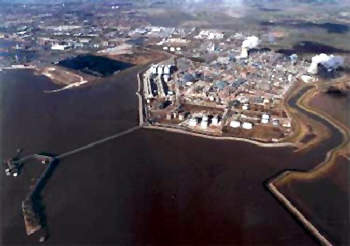
In June 2007 a consortium of companies in the UK, including British Petroleum (BP), Associated British Foods plc (ABF) and DuPont, announced plans to build one of the largest biofuel production plants in Europe along with a ‘high technology’ demonstration / pilot plant for biofuel (biobutanol) development. The consortium established a new company called Vivergo Fuels to operate the plant.
The commercial-scale plant will convert a variety of feedstocks, from wheat and sugar beet to ethanol, and will produce 420 million litres of fuel ethanol a year. The wheat for the plant will be sourced locally via an agreement between the joint venture and two other ABF businesses, Frontier Agriculture and AB Agri. Apart from ethanol, the plant will also produce nearly 500,000t of dried distillers grain with solubles (DDGS), a high protein animal feed.
The total investment in the biofuels plant is $400m. The investment is divided between BP and the ABF subsidiary British Sugar will each own 45% of the new grass roots facility, with DuPont owning the remaining 10%. Once operational the plant will provide about 70 new full-time posts in addition to the jobs generated by the construction phase. The European Investment Bank (EIB) is providing £60m of the finance for the plant to ABF at an attractive interest rate.
The plant is expected to cost an estimated £200m to construct. Once operational the plant will provide about 70 new full-time posts in addition to the jobs generated by the construction phase. The European Investment Bank (EIB) is providing £60m of the finance for the plant to ABF at an attractive interest rate.
Biobutanol demonstration plant
The bioethanol plant will be constructed in conjunction with a biobutanol pilot plant which will be used to develop the next generation of sustainable biofuels (capable of producing 20,000l a year) from a wider variety of feedstocks.
Contracts and construction
Aker Kvaerner is the engineering company that was selected by Vivergo Fuels to execute the Front-End Engineering and Design (FEED) for the project. Aker Kvaerner is working on the project in conjunction with its joint venture (BioCnergy Europa) partner Praj Industries (Praj) from India to provide the technology and process package. The award of the FEED project was followed by successful completion of the feasibility study for the plant, which was completed by Aker Kvaerner and Praj in December 2006.
Work on the preparatory phase of the project began in July 2007.
BioCynergy Europa joint venture
In June 2007 Aker Kvaerner formed a joint venture with Praj Industries, a leading biofuels solution provider to form a new company called BioCnergy Europa. Praj holds 60% in BioCnergy, while Aker Kvaerner holds 40% of the shareholding.
BioCnergy will build upon the individual strengths of its founding partners to offer European customers customised solutions for their biofuels projects.
The JV will provide the technology package, engineering services, equipment and systems, project management services, construction and erection services, and commissioning, as well as turnkey biofuel plants.
BioCnergy will address both the ethanol and biodiesel opportunities in Europe. Biofuels demand is likely to go up more than three to four times the present consumption by 2010. The relationship between the joint venture partners is already well established through a strategic alliance formed in 2006. The board of BioCnergy will consist of two members each from Praj and Aker Kvaerner.
Bioethanol technology and production
Using bioethanol technology provided by Praj Industries, the grass roots plant will use locally grown wheat and sugar beet as feedstock to produce fuel ethanol. Praj Industries is a global Indian company with experience in alcohol and brewery technology and related bioprocessing and engineering.
Although initial production will be bioethanol, the partners are also due to look at the possibility of converting the plant to biobutanol once the required technology is available.
To start the market development of biobutanol in the UK BP and DuPont will import small quantities of biobutanol sourced from an existing first generation biobutanol manufacturing plant in China.
The first product is expected to arrive by the end of 2007 for advanced vehicle testing. Biobutanol can be used in engines with little conversion and has been put forward as the clean fuel for aircraft (Richard Branson of Virgin Atlantic hopes to run his fleet of aircraft on butanol and is investing in the technology).
Biofuels
An increase in the use of biofuels will help to reduce overall emissions of greenhouse gases and they are a ‘sustainable’ alternative to fossil fuels. The bioethanol produced will be blended in various proportions into normal petrol.
It is accepted that using bioethanol as a fuel can reduce overall carbon dioxide emissions compared to a traditional petrol-only engine.
The Renewable Transport Fuel Obligation (RTFO), which was first announced in November 2005 in the UK is a requirement on transport fuel suppliers to ensure that, by 2010, 5% of all road vehicle fuel it supplied is from sustainable renewable sources.
It is expected that the introduction of the obligation in April 2008 will cut annual carbon emissions in the transport sector by between 2% and 3%. In mid-2005, biofuel made up 0.25% of overall road fuel sales.



